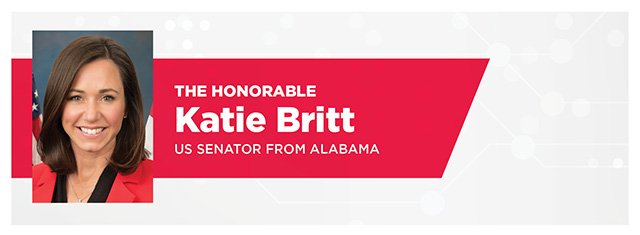The Honorable Katie Britt

Which policy priorities or legislative efforts are you most proud of that help advance cancer prevention, early detection, treatment, or patient care?
“I’ve been grateful to work on a specific piece of legislation, the Access to Breast Cancer Diagnosis Act, or the ABCD Act, with Senator Jeanne Shaheen of New Hampshire in both the 118th and 119th Congresses. We know that it’s critical for women to be screened and diagnosed as soon as possible to give them the widest variety of treatment options and the best chance to defeat this disease. Our bipartisan legislation would ensure that a warranted follow-up diagnostic examination is also covered by health insurers with no out-of-pocket cost to the patient. It’s estimated that 1 in 8 women will be diagnosed with invasive breast cancer in their lifetime. In my home state of Alabama, around 4,500 women were diagnosed in 2023. Diagnostic tests, which are necessary in about 10 percent of cases, can cost patients hundreds of dollars. No woman across America should not be able to confirm whether she has a life-threatening illness when the resource is readily available. I believe this is commonsense legislation, and I’m proud to champion it in the Senate.”
What message would you like to share with the scientists, clinicians, and patient advocates working every day to make progress against cancer?
“Thank you. Your work keeps our children safe, our families strong, and our communities thriving. In Alabama, we are so incredibly proud of the University of Alabama at Birmingham’s O’Neal Comprehensive Cancer Center. The researchers and doctors at UAB O’Neal give patients and families hope—not just in Alabama, but across our nation as one of our preeminent comprehensive cancer centers. As the O’Neal Center continues to pioneer lifesaving research, advance innovative treatments, and deliver world-class care, I’m proud to support its mission of bringing hope to families and communities with the ultimate vision of a life without cancer. We have seen encouraging steps forward—from new immunotherapies to breakthroughs in early detection—but there is still so much more to do. My commitment to being a partner on the federal level extends to all of the incredible researchers, doctors, and advocacy groups who work diligently to support those who have been affected and those who might one day receive a cancer diagnosis. You have all made extraordinary contributions to patients, to finding cures, and to the future of medicine.”
Bipartisan support for cancer research has been a hallmark of progress over the past several decades. Why do you believe this issue continues to bring both parties together and why must that commitment continue?
“Cancer has tragically touched the lives of so many—a majority of Americans have been affected by this deadly disease. I believe Congress has a duty to ensure we continue to support lifesaving and life-changing research. At the federal level, I’ve been grateful to work with a number of my colleagues in a bipartisan fashion to advocate for continued investment in cancer research to innovate and save lives moving forward. I believe this sustained federal support is critical to developing innovative treatments and finding cures for all types of cancer. Ultimately, treating and defeating cancer is not a partisan issue. The fight against cancer deserves unity across the aisle to ensure progress continues so every American—regardless of zip code—can benefit from the very best in cancer care.”
As scientific innovation accelerates, what opportunities do you see on the horizon for improving outcomes for cancer patients in the United States, particularly in rural or underserved communities?
“In Alabama, 55 of our 67 counties are rural. Access to high-quality healthcare across rural communities remains a top priority of mine. I have been proud to work with many of my colleagues on both sides of the aisle to advance solutions to support families in every corner of our nation. I joined Senators Maggie Hassan of New Hampshire, Susan Collins of Maine, and Tina Smith of Minnesota to introduce the Rural Obstetrics Readiness Act. Our legislation would equip rural hospitals with the tools, training, and resources to deliver urgent obstetric care. We would help medical professionals prepare to handle obstetric emergencies that come through their doors and ensure women have access to high-quality care throughout their pregnancy journey, no matter their zip code. Additionally, telehealth has become an indispensable resource for countless communities—I’m committed to advancing legislation that expands access to telehealth services. It’s imperative we support the ability of our healthcare workers and medical providers to reach and treat more hardworking families in every corner of America. I’ll continue to work diligently at the federal level to support timely and accessible healthcare solutions.”
